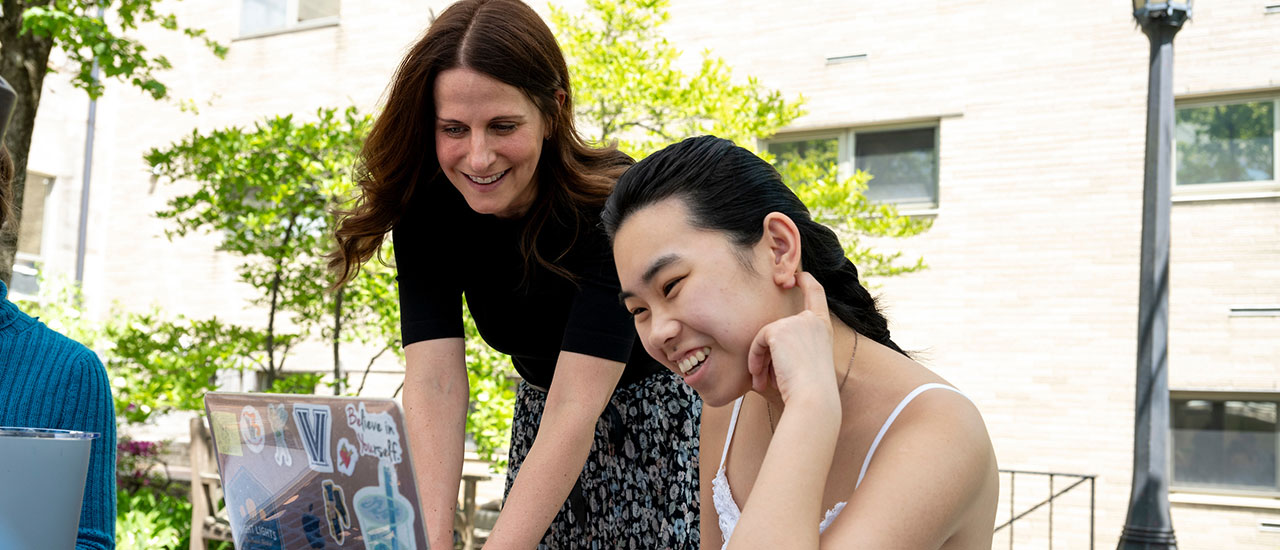HONORS CURRICULUM

SEMINAR APPROACH
The seminar structure provides an ideal environment for the development of effective communication and critical thinking skills, fostering independent thinking, clarity, focus and sound critical judgment.
INTERDISCIPLINARY
Students can tether their interests to Honors' interdisciplinary model and branch out into global concerns, applying the knowledge they have gained to propose and implement systems and solutions that make a difference locally, regionally and on the world stage.
MEANINGFUL DIALOGUE
Grounded in honesty and mutual respect, intellectual dialogue occurs in classrooms, in residence halls and beyond, allowing students and instructors alike to explore the connections between the academic world and our contemporary experience.
GLOBAL
Honors students are encouraged to continue their Villanova education and expand their worldview through study abroad experiences. Up to six Honors credits may be taken through study abroad and scholarships are available.
THE HONORS EXPERIENCE BY COLLEGE
COURSES OFFERED
Honors programming includes cohort classes that offer an integrated sequence of themed courses, core- and upper-level seminars, independent research and a capstone senior experience. Full course offerings and descriptions can be found through the link below.
One-Credit Colloquia Courses
These are graded courses that the Honors Program offers every semester. Generally, one-credit courses enjoy 1/3 meeting hours, 1/3 readings, and 1/3 deliverables of a regular 3-credit course. Three of these courses may be bundled to form the equivalent of one, 3-credit, upper-level Honors course counting towards an Honors Credential.
One-Credit Enrichment Workshops
These are ungraded courses, in which students are evaluated at the Satisfactory/Unsatisfactory level, that the Honors Program offers every semester. Generally, an Honors Enrichment Workshop is designed to enrich the student experience and does not require the level of work that a one-credit course demands. These courses, however, will count toward your course credit allotment each semester, but will not count toward an Honors credential. The course will show up on your transcript, and "Satisfactory" or "Unsatisfactory" will appear in place of regular letter grades. Refer to your college advisor to see if an individual non-credit Honors course counts toward a college credential.
Introductory Courses
These courses fulfill specific Core requirements in the Humanities (History, English, Philosophy, Theology), Social Sciences (Political Science, Psychology, Sociology, Economics, Geography), Mathematics, the Fine Arts, the Augustine and Culture Program (ACS), Ethics and Business.
Upper-Level Courses
The program also offers a variety of upper-level courses, which may be used to fulfill free-elective requirements or elective requirements in some majors. In addition to these regularly scheduled seminars, students are encouraged to design more specialized independent study courses in which they can work individually with a faculty mentor.
NOTE: Please refer to the Registrar’s Master Schedule of Classes for the most up-to-date courses being offered in Honors. At the first menu, scroll down to ‘Fall 2024’ and click the ‘Submit’ button. At the next menu, scroll down to ‘Honors’ and then click the ‘Class Detail Search’ button at the bottom of the screen. This will display the most up-to-date courses being offered in Honors for Fall 2024. Courses with the HON prefix, H sections (i.e.-H01), courses with Honors attributes, and graduate courses count for Honors credit. The schedule is not always correct, so you should always consult with the Master Schedule of Classes.
SENIOR THESIS
- The Senior Thesis should be original in its conception and analysis. Originality, however, need not mean the discovery of new knowledge, but can be reflected in the questions posed, the synthesis formed, or the organization and presentation of data.
- Theses should be the result of serious research, original thinking, and a clear understanding of the issues surrounding a topic. Since in-depth, comprehensive studies are usually preferable to broad surveys, topics should be feasible in terms of the students’ competencies and the time available.
- Students should possess some background knowledge and any essential methodological skills prior to embarking on the thesis. The final paper should place the specific topic in a broader scholarly context by exhibiting familiarity with other literature on the subject.
- Students involved in projects involving empirical research should develop a testable hypothesis, design and conduct a study to test it, and analyze the results in an appropriate manner.
- Length should be determined by what is appropriate for the particular subject.
